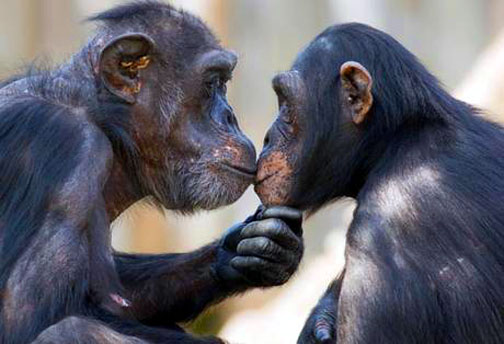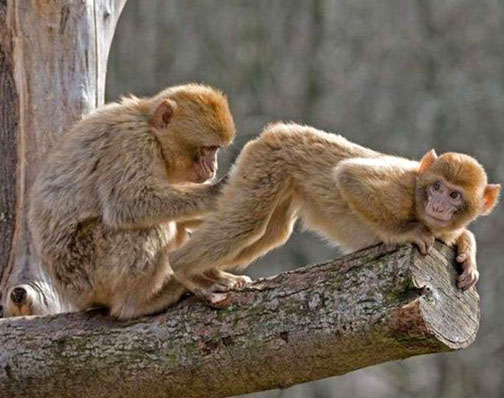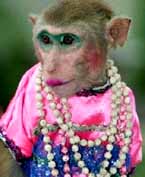Tags
They say that money is the root of all evil. They say that money can’t buy happiness. I’m not sure who ‘they’ are, but suspect it is a bunch of poor people who’ve never bought a happy ending in Thailand. Money is a wonderful thing. It makes the world go round. Everyone wants it. Everyone needs it. And if you don’t think it is a fair trade for that which puts a smile on most people’s faces, you don’t know jack. Or capuchin monkeys. Or chimps, or bonobos. Sexpats in Pattaya, may well lend themselves to your argument, but even they readily spend their money on happy endings. It’s just that they love often their limited, dwindling cache of cash more than what it can bring. And by short changing the source, they often find themselves the ones who end up being the monkey’s uncle. ‘Cuz some of us just haven’t made it very far up that evolutionary tree.
And yup, that smells like science to me.
Economic researchers at Yale University managed to successfully train capuchin monkeys to understand and use currency. The result? The monkeys used their new found currency to buy sex. But wait! There’s more! Once they got the hang of what money was all about, our not-so-distant cousins began acting quite human-like. Yale’s capuchins responded to the vargarities of the market place, took to gambling like a duck to water, failed to save, stole when they could, and used money to buy more food than they could eat. And to buy a bit of nookie too, of course.
The capuchin, a New World monkey about the size of a scrawny one-year-old human baby, has a small brain. One that is pretty much focused on food and sex according to Yale economist Keith Chen. Along with his colleague, psychologist Laurie Santos, he set out to teach his capuchins to use money to buy grapes, apples, and Jello, a conditioning he thought possible considering their natural glutton-like desire for food. “You should really think of a capuchin as a bottomless stomach of want,’’ Chen says. ‘’You can feed them marshmallows all day, they’ll throw up and then come back for more.’’ Exchange ‘gin’ for ‘marshmallow’ and that starts sounding like a familiar tale. But then ‘a bottomless stomach of want’ probably already took you there.
Step #1, which took several months, was to teach the monkeys that small silver discs, the currency Chen decided on, had value as a means of exchange for treats, and would remain valuable again the next day. Obviously he didn’t factor in exchange rates. But then many potential sexpats when planning their big move don’t either. Step #2 involved presenting each monkey with a set handful of currency and allowing it to decide how much of its limited funds to spend on the treats it wanted to purchase. For example, that monkey might prefer grapes over cubes of Jello and would be willing to fork over twice the amount of silver discs for a grape. Much as a sexpat might value his next glass of gin over the cost of a cheap all-you-can-eat buffet dinner. This supposedly taught them the concept of budgeting. The monkeys, not the sexpats.
Next Chen introduced the idea of fluctuating monetary values to see what the monkeys would do if, for example, the two coin value of grapes dropped to the cost of one coin. And just like sexpats responding to a sale at their favorite boy bar, the monkeys adhered to the rules of utility maximization and price theory: when the price went down, they bought more (cue memory: they’ll throw up and then come back for more).
Following the idea that if you love food and sex to excess, you’re bound to love gambling too, Chen next introduced two gambling games to the primates. Both offered the same gamble, but one game started the monkey out with a grape and if by a flip of the coin he won, he got to keep his grape and won a bonus grape to boot. The second game started out with the monkey owning his original grape and a bonus grape. If he won he got to keep both, if he lost he had to give up his bonus grape. The games’ odds were identical and the laws of economics state because they represent such small stakes both games of chance should be treated equally.
But along with small stakes you are dealing with small brains and the monkeys responded favorably to game #1 while #2 they were not so big on. This phenomenon – known as loss aversion – is prevalent among humans too. No one likes to be a loser, even if there is no difference to your pocketbook. Even monkeys. Which wasn’t surprising to Chen. What he didn’t expect, however, was what he observed during the hectic gambling binge in the monkeys’ cage.
During the betting chaos the capuchins proved that they’d totally grasped the idea that the most distinguishing characteristic of money is its fungibility, the fact that it can be used to buy not just food but anything. While some of the monkeys were busy gambling (probably those who’d lived in Asia before their capture) one of the non-involved male monkeys traded one of his coins for something even more satisfying than a grape: he paid a female monkey to have sex with him. Proving prostitution probably is the world’s oldest profession, dating back even before the advent of man. And to prove it wasn’t just a fluke disguised as a bit of sex for sale, immediately after reaching orgasm the female monkey traded in her pay for a grape.
Anti-prostitution proponents like to cite all of the other horrible crimes that they love to lay at prostitution’s feet. Sadly, they may be onto something. Chen’s capuchins weren’t just into paying for sex. They were big on counterfeiting and thievery too. During a different experiment using cucumbers as a treat, but using the same monkeys, a research assistant sliced the cucumbers into discs. One capuchin picked up a slice, started to eat it and then ran over to a researcher to see if he could use it to buy something else (the study failed to note if he wanted to use the funny money to buy a grape or a quickie). And while none of the monkeys tried to save their money, instead spending every penny they had as soon as it hit their hot little hands, several were not above grabbing what wasn’t theirs.
Soon after Chen’s monkeys figured out what money was for, the researchers noted they would try to grab an extra disc or two more than their allotment whenever they could get away with it. So much for the phrase ‘human greed’. The coins were handed out in a chamber adjacent to the monkey’s communal cage. Once, one wily primate outdid his brethren in his quest to nab what was not his by grabbing the entire tray of coins, throwing it back into the main cage and then scurrying in after his loot – a combination jailbreak and bank heist. The researchers had to use grapes as tea money to get the coins back from the monkeys who’d all joined in on the thief’s good fortune, a reinforcement that in effect encouraged more stealing. Kinda like paying a bar boy who fails to perform.
While other primates tend to leave the baser crimes associated with the underworld to capuchins, they too give an opposable thumbs up to prostitution. Anthropologists studying wild chimps living in the Tai National Park in the Cote d’Ivoire found that female chimpanzees often offered sex in exchange for meat from male chimps. And, perhaps not surprising, the best male hunters ended up having the greatest number of paid sexual partners. Even chimps recognizee the value of a wealthy sugar daddy.
But more on point, the scientists also found that these acts of prostitution were seldom one-offs. “Our results strongly suggest that wild chimpanzees not only exchange meat for sex, but many do so on a long-term basis,” said Cristina Gomes of the Max Planck Institute for Evolutionary Anthropology in Leipzig, Germany. Her study, published on-line in the Public Library of Science, suggests the phenomenon of a moneyboy turning into a LT relationship is not unique to Thailand. Chimps mastered that form of relationship long before Patpong and Pattaya were established.
And then there are the sex-crazed bonobos, the only species of ape other than humans to have sex facing each other. Sharing about 98.4% of our DNA, they are also one of the only species sexually active nearly year round, along with humans. Unlike humans, however, bonobos are almost entirely peaceful, being mostly vegetarians and pacifists . . . just when you thought I was gonna segue back into comparing Pattaya’s sexpat population to monkeys and apes.
No fear, there are some similarities: Bonobos regularly have gay and lesbian sex. And they have sex as much as several times a day, which would seem to be too often for purely reproductive purposes. Not that the gay and lesbian sex thingy promotes that agenda either. And for Beachball’s edification, since he considers self-awareness a hallmark of being a ‘genuine’ human being even though it is something he has not yet mastered himself, bonobos are one of the few animals that have passed the mirror-self recognition test, which is the capability of understanding that their duplicate in a mirror is not a different bonobo on the other side of a window. But more importantly, bonobos frequently exchange fruit and other goodies for sexual favors too; prostitution among primates is a popular economic transaction. But then we can all agree that money in and of itself has no value. It’s what you can use money to buy that counts. And an orgasm, evidently, is one of the animal kingdom’s most highly valued consumer goods.
Though just like not all humans – or sex tourists – engage in prostitution, not all apes do either. Some are just as happy to barter their goods for some good whacking material (uh, I’m talking about apes now, not Boo Hoo). A study out of Duke University showed that male rhesus macaques willingly give up something they value highly (juice) just for the chance to drool over the sight of female macaque’s hindquarters. Yup, rhesus monkeys are ass men. Or as the researchers put it, “Virtually all of the male monkeys will give up juice to see female hindquarters … they really value those images.”
Macaques, however, are not as big on gay sex as bonobos are. Duke’s scientists found that to get their monkeys to look at boy booty researchers had to bribe them with larger glasses of juice. So even monkeys will go gay for pay. But at least they understand the economic prerequisite of paying bigger bucks to be sexually satisfied by a straight boy, or one who would otherwise not want to have anything to do with you. We can only hope that Pattaya’s sexpats may one day come to that realization themselves.
Related Posts You Might Enjoy:










vargarities?
I think it’s a high compliment to some sexpats to compare them to those monkeys !
lol
Right.
My apologies to the monkeys.